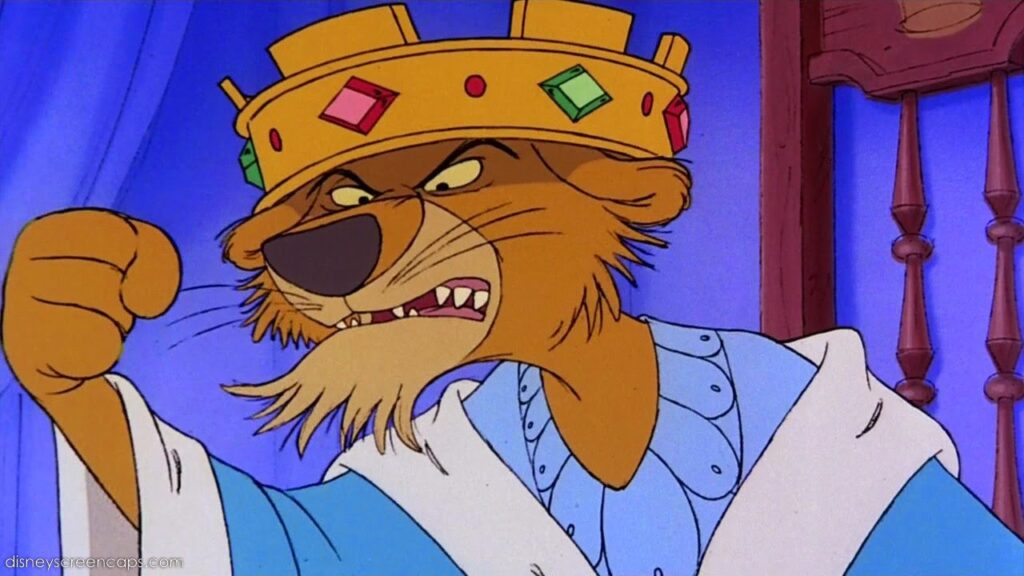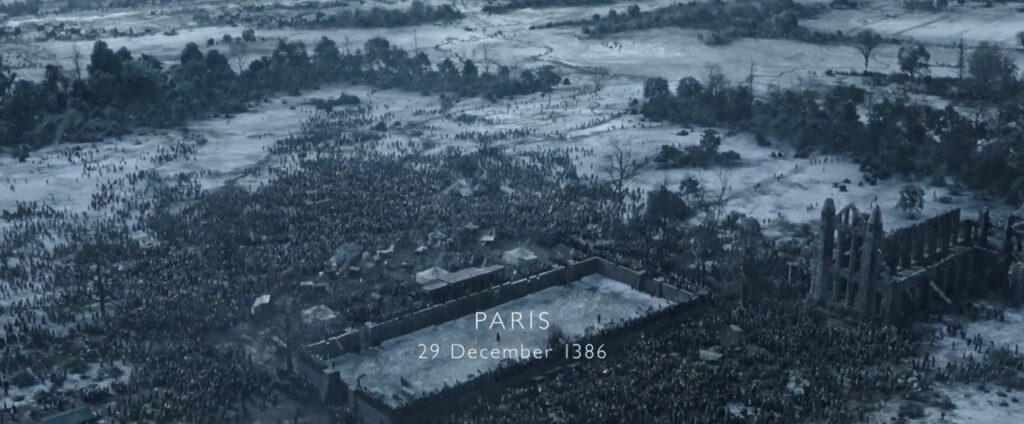10 Reasons Why The Last Duel Is Terrible. First, let me say this. Blade Runner is one of the greatest movies of all time. Oh, whoops, so too was Alien, and Aliens while we are at it. Oh, and also Gladiator, the Duelist, Black Hawk Down, The Martian, and the one to top them all… my own personal favorite of them all? Legend. Believe it or not. And I haven’t even gotten started. All of these movies were birthed and brought to life by Ridley Scott, one of the greatest directors of all time. The guy is a genius. But when he said – “This is a broad stroke, but I think we’re dealing with it right now with Facebook. This is a misdirection that has happened where it’s given the wrong kind of confidence to this latest generation, I think.” What is Ridley talking about here? Is he decrying the horrifying disparity of wealth and poverty in the world? The lack of vaccines in the third world? Global hunger? Uh, no. He’s unhinging about the fact that his latest movie, The Last Duel, flopped terribly. Wait, hold on. What’s A Last Duel?
The Last Duel tells the story of a rape set in the world of 14th century France. It tells the story based on the book, The Last Duel: A True Story of Trial by Combat in Medieval France by Eric Jager. (Which I just read – and if this story fascinates you, please do yourself a favor by just checking this book out of your local library. Way better history and details about the story that happened here. Trust me.) This story is all about Jean de Carrouges (Damon), a squire who challenges his friend, squire Jacques Le Gris (Adam Driver), to a duel… a duel to the death. OoOoOOooooooh. Why? Because Jean’s wife, Marguerite (Jodie Comer), accused Jacques of raping her while her husband was in Paris collecting his fee for warring on behalf of the king. Ack. And the movie tells the details of the rape from all three of the main players vantage points.
Yes, you heard me correctly. We watch this ghastly topic happen not once, not twice, but three times. Over, and Over. AGain. GAH!
The Problems with The Last Duel Enumerated
Ridley Scott, originally worried that when Disney purchased 20th Century Fox, they’d screw the entire thing up. But his complaints above had nothing to do with Disney. Apparently they let him make the movie he wanted to make. Instead, he was more concerned about moviegoers today being breastfed on “these fucking cell phones.” Alex, can I get Disinterested Millennials for $1000?
But I’m worried that Ridley might just be horribly out of touch with what is good, and what is bad, in the cinemaplex now adays. Yes, I know I’m speaking disrespectfully to one of my own idols. I’m sure this will keep me from ever getting that one-on-one interview I’ve always been dying for. Oh well.
#1 – The accents – oh, come on. Yes, I know Americans can’t stand movies in other languages. Got it. But the accents in this movie were so all over the map, I literally stopped watching just to look up what movie the story was supposed to be set in. FRANCE?!? WHAT? Yes, I understand Matt Damon and Ben Affleck couldn’t pull off a French accent if it full-on bit them in the butt. But Comer could! She is utterly wasted in this role. She is so capable on this front, your honor, I point you to this evidence, and ask you to submit it for the record. So, maybe, they would have done better to enlist anyone other than the Damon/Affleck duo and done the accents correctly. (Maybe Driver would have pulled it off? I really don’t know.) Hell, have everyone do the Boston thing… at least it would have been consistent!

#2 – The Playboy – I’m sorry, but Ben Affleck as a medieval playboy is just stereotypical stupidity. All I can see when I look at Affleck’s blond hair and blond goatee is Prince John from Disney’s Robin Hood (one of the greatest cartoons of all time – you will not argue this point with me). There is a scene where he has three women (sorry, wenches) in his bed giggling and laughing together while they wait for him to return to the bed. Come on. People in this day and age were burnt at the stake for way less than that. Yes, the man did have one illegitimate son. But they are making him out to be a porn star in this movie.
#3 – The Mullet/The Scar/The Acting – Did anyone else have an enormous problem with that really poorly done scar on Matt Damon’s cheek? And his mullet? Accuracy be damned. Maybe I’m alone in my despising the acting in this movie. Generally it comes off like rewarmed cabbage. Was this an attempt at Shakespeare? Or the Flintstones? I couldn’t tell. And Affleck’s constant “Fuck it… Fuck that”?? And then you have others staying more in character by calling other people sows? Does this logically follow to you? Slate put it this way: “If Affleck and Driver at times appear to be on loan from a different, dopier movie, possibly one involving Monty Python, they both have such a cape-swooshing, mustache-twirling good time that it’s hard to blame them for going all in on their characters’ villainy.”
#4 – The “Court” Hearing – The Trial. That’s it, that’s point #4. What? Fine. I’ll say more. In 1386 France, they didn’t conduct American style court hearings. And they CERTAINLY didn’t question women in front of the King. The entirety of that charade was just stupid. Yes, Marguerite’s account was rigorously noted, and the details questioned before the “trial” with the king. But the trial itself was comprised of two statements, one by Jean, and another by Le Gris. These statements exist to this day, and you can read them in their entirety. If you can read medieval French that is. But they are 5 portfolio pages for each testimony. They are expansive.
If you are curious – the legal process to get to the end of this movie would have gone something like this:
- File an appeal – wherein he would accuse the defendant and demand his right to prove his charges in combat. Le Gris was not required for this step.
- A formal challenge then occurs. A ceremony wherein the presence of both parties was required. Jean would have accused the defendant to his face.
- The two men would assemble a hefty number of pledges who would attend as witnesses.
- The charges would go from the King over to Parliament, and they too would be required to attend in full.
- After, this would be followed by very specific oaths, promises, and flourishes. Depositions taken, evidence noted, etc.
Hell, the royal register on that day doesn’t even list that Marguerite was even there! But we do know that during one questioning, Le Gris was in the same room with Marguerite because he states he has only seen her on two occasions. The two men would submit their testimony, and the testimonies would be examined to ascertain whether or not the duel was warranted. And it was noted that Marguerite had given statements separately which were validated by the Parliament as well. But the entire scene with the King, and Marguerite, and the questioning et al.? Tripe. Works well for American audiences hoping for justice, but otherwise, bah.
#5 – The fixation with sexual pleasure – The book, and the movie, both point out that the prevailing thought of the day was that a woman couldn’t get pregnant unless she experienced “the little death” during intercourse with her husband. Why? Because lineages of the day were critical to literally everything, and if a man could rape a man’s wife, and then could disrupt his legal lineage?? That then throws the entire basis for the economy, inheritance, land ownership, legal standing, etc. out the window. So, conveniently, they just decided that it was impossible for a woman to get pregnant if she was raped… unless she enjoyed it. Right? But it was a legal construct more so than it was a real scientific understanding. It was convenient.
But let’s be clear, I mean, I could be wrong here, but it didn’t seem like Marguerite had a little death in any of the scenes, whether with her husband, or Le Gris. And every time she was asked if she enjoyed sex with her husband it was obvious she was lying when she said she did. So was this movie creating a moral equivalence between Le Gris’ raping her, and Jean’s marriage of political convenience? Because that is all kinds of problematic in my mind. I mean, sure, women were property… and were traded like chattel in order to support and foster familial strength. But… honestly? Was that the point of the movie? All women were being raped even by their husbands? Is that what was happening here? Nahhh.
#6 The repetitive story – the first pass at the story was told from Jean’s perspective. But the movie is so long the editing was super choppy, and really tricky to follow. Jump cut, jump cut, jump cut. Wait, what happened back there? Don’t ask, we’ll be back, promise. And from Jean’s perspective we get a fairly flattering view of his professional war profiteering. We get nothing of his previous wife, or his son’s death. We learn that he was wronged by Le Gris by his stealing of a piece of land promised to him for marrying Marguerite, and between that and his failure to snag his father’s captaincy… this guy was a powder keg ready to blow. Yup, even spun in a good light, we can see that he is brash, and outspoken, but he believes he’s doing the right thing for the King ultimately… and if everyone would just STOP belittling him, everything would be right in the kingdom.
#7 The repetitive story – the second pass at this story was told from Le Gris’ perspective. We learn that he came from a humble family, and he is a learned man, intent on using his intelligence for the betterment of the kingdom. That, through his intelligence, he was able to set the King’s nephew’s (Pierre d’Alençon – Ben Affleck’s Prince John Character) to rights. Le Gris snagged Jean’s property, and infuriated Jean to no end. But we also see that Le Gris is a philanderer to end all philandering… well, outside of Pierre’s philandering that is, but that is a different story entirely. But Driver as a cape swirling (like, literally… his cape swirling should be studied he was so prolific a cape swirler in this movie) evil foil, is only here to prove that he deserved to die at the end of the day.
#8 The repetitive story – I literally was confused as the second pass on this story ended and we were starting over again. And when I realized we were seeing it from Marguerite’s perspective, I literally said out loud… “OH NO!” But other than learning that Marguerite was actually smart (though it was alluded to in the previous two sections), literate, and good at keeping her husband’s books (Never mind that it was assumed that all wives of the day would keep their husbands books when they were gone. But okay.), compassionate, and better at this management thing than her husband, we really didn’t learn anything new in this pass. I didn’t anyway. Worse, I figured that if we were going to have to watch her rape again from a new vantage, we would actually learn something new… but we don’t. Literally nothing. Okay, not true. We do learn that Marguerite was socially ostracized for her really abnormal decision to announce the rape. But I mean, isn’t that assumed? Yes, it was good color. Great. GAH!

#9 – The Facts – Just read the book – it’s a fascinating read. But after reading the actual arguments, and the actual case? I actual don’t think Le Gris did it. I promise you I’m not trying to troll you. I just think that it would have been very difficult for him to cover the 24 miles to Marguerite’s house in order to rape her, and then get back without being noticed. He had witnesses for the entire week. This was one of the biggest cases in hundreds of years. It had the involvement of the King. No one saw him making this incredibly fast ride, or documented his change of horses (which would have been required to have pulled off a timeline that works.) or anything.
There was one or two lines in Le Gris’ defense where he states that Jean attempted to slander Le Gris by having his first wife state that Le Gris had had sex (not rape, sex) with her, in order for Jean to bring a case against Le Gris. Here is the particular quote from the book I am referring to: “Even more damaging, Le Gris charges that Carrouges tried to get his first wife to say that Le Gris had slept with her—’which the said wife, wise and good, refused to do, since it was not in any way true.'” The two men were friends – no, not only were they great friends, but they were considered blood. Le Gris was Jean’s first son’s godfather. (Which, at the time, made them blood and as a result, one of the charges Jean brought against Le Gris was incest!) But their hatred for one another was really well established for the day. And it really makes sense to me that Jean, being so very wronged by Le Gris, would want to find any way that he could to kill this other man. And he did… he figured out a way.

#10 – #MeToo Misogyny – I’m sorry, but there is an enormous dissonance happening here. When you place a #metoo movement idea in the world of built-in-legalized-misogyny and inherent sexism it just should explode your brain. Let’s be clear, women had no rights in 1386. They were property. Unfortunate as that sounds. Place on top of that the idea that while yes, Marguerite was brave for standing up and declaring the rape, it was her husband’s legal fight. (WHAT? I’ll be burnt at the stake if you lose??!? Oh, come on. She knew.)
I just can’t square this. #1386MeTooers unite! Unless, the point of the movie was to say that women weren’t appreciated back in Medieval Europe? And if so… uh, DUH. Yes, women could be secretly well read, and secretly smarter than their husbands. Got it. Hell, that trope plays out today. Many women today struggle if they get too advanced a degree, because many men are too insecure at being less educated than their wives. I would love to hear stories about this sort of chauvinism in the comments section. Are you a female that was dumped for appearing too smart for your male counterpart? It’s sad, but it’s true. Got it. But, please, don’t tell me that that is what this movie is trying to teach us. It’s really the only real conclusion I can come up with that jives all this repetitive nonsense together the most fluidly.
Final Thoughts on The Last Duel
Originally, this post was twice as long because I began making a very detailed case to the fact that I believed Le Gris was innocent. To say I got a little wrapped around the proverbial axel is fact. If you are interested in reading those detailed thoughts, I’ve preserved them right here. Because some of you are just as twisted as I am! hahaha. But over all, I disdained this movie with a passion I cannot even explain. Why? The cinematography was AMAZING. The special effects, the CG, the details, all were unprecedented and fantastic. But there was no coherent point to this movie, no clear raison d’etre. Just a vehicle for a messy and unfortunate story. Was it a medieval #metoo companion piece? That makes no sense. But okay. I will say this though, that duel at the end was epic. And really really close to what actually happened. The jousting, was similar to how it was depicted in the movie. Le Gris also stabbed Jean in the leg, for real. And it probably was through Jean’s loss of blood that Le Gris slipped, enabling Jean to get the upper hand and run his opponent through with his sword.
But if this movie did one thing well, it is that it reminded me for my love of history. It reminded me there are so many unread stories, so many amazing events, and all are worth study and reading about. So, Ridley, thanks for that. But as a movie? It needs a top to bottom rework. It’s a horrible movie and I refuse to back down on this point.
Edited by: CY



